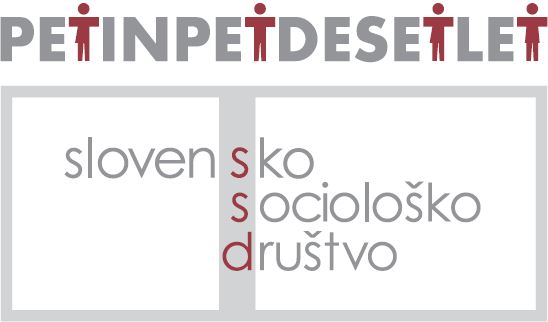Social Science Forum 91 (XXXV)
Slovenian social support networks in a long-term perspective, 1987-2018
Hajdeja Iglič
ABSTRACT: This article examines the effects of macro-level processes – economic recession, growth of the service economy, and deindustrialisation – on the social support networks of residents of Slovenia in the period between 1987 and 2018. Before the transition, Slovenia enjoyed highly functional social support networks. The economic downturns of the early 1990s and late 2000s increased the probability of insufficient social support. The growth of the service economy saw the importance grow of formal sources of support. Socio-demographic changes captured by the notion of the post-industrialisation of society brought various effects: the increased educational level and diminished size of households impacted the growing presence of formal sources and mixed social ties in support networks, while the ageing population contributed to the increased presence of networks with insufficient social support. We conclude that Slovenian social support networks have experienced a distinct transformation over the last three decades.
KEY WORDS: social support networks, Slovenia
>> Download
Management of Stress Emotions in the Workplace
Jerca Pavlič, Zdenka Šadl
ABSTRACT: The article deals with work-related stress that ever more employees experience in the modern business world. The article criticises the discourse of the individualisation of stress, which states that employees must construct themselves as individuals and shape their own reality beyond the scope of broader collectivism. The authors set the model of managing stress emotions at a group level and deal with the concept of a group emotional culture, which enables employees to be more successful and effective in coping with stress by using group emotional norms, strategies, rituals and routines and cultural artefacts. The article focuses on the problems of growing work-related stress, which ought to be characterised as an organisational problem and dealt with on a primary, secondary and tertiary level.
KEY WORDS: work-related stress, stress emotions, discourse of the individualisation of stress, group management of stress emotions, group emotional culture
>> Download
Land as an indicator for national resource based policy issues: the case of spatial resource distributions in Israel
Shulamith Gertel Groome, Marjan Hočevar
ABSTRACT: This interdisciplinary geo-spatial overview represents a conceptual foundation for policy research concerning allocations of public commodities as represented by land (settlement) resources. Principles of collective vs. individual rights to benefit from these may pose moral dilemmas for decision-makers. Such a conflict of interests could prompt ‘ambiguous’ governing decisions that lack clear directives for implementation. The resulting policies might support declarations of multicultural inclusivity while embracing exclusive ethnic communities. A case in point is the Israeli spatial policy on Arab and Ultra-Orthodox minority groups, analysed using primary and secondary sources and statistical data relating to political affiliations, income, housing costs and locational preferences. If land is an adequate indicator of ambiguous resource-based issues, further analyses should define how socio-spa-tial distributions are decided and at which particular stages of the policy process.
KEY WORDS: spatial inequality, socio-spatial control, spatial policy, land distribution, spatial resource
>> Download
Images of Muslims on lemonde.fr during the period of terrorist attacks in Europe in 2015–2016
Polina Shevchenko
ABSTRACT: The purpose of this study was to analyse images of Muslims appearing in articles published from 2015 to 2016 on the website lemonde.fr. At this time, the country was faced with terrorist attacks that resulted in various government decisions and a complex emotional state of the nation. The study includes 617 articles from lemonde. fr, individually refined through 16 keywords. The quantitative and qualitative content analysis allowed for three main thematic categories of articles to be determined: Muslims as potential terrorists, the incompatibility of Islamic religious symbols with European values, and Islam as an obstacle to secularism in school. Muslims were represented as victims of discrimination or as criminals. These images negatively affected the perception of this religious minority in France and may have led to complications in intercultural communication.
KEY WORDS: Islam, media effects, images of Muslims in the media, the image of Islam in the media
